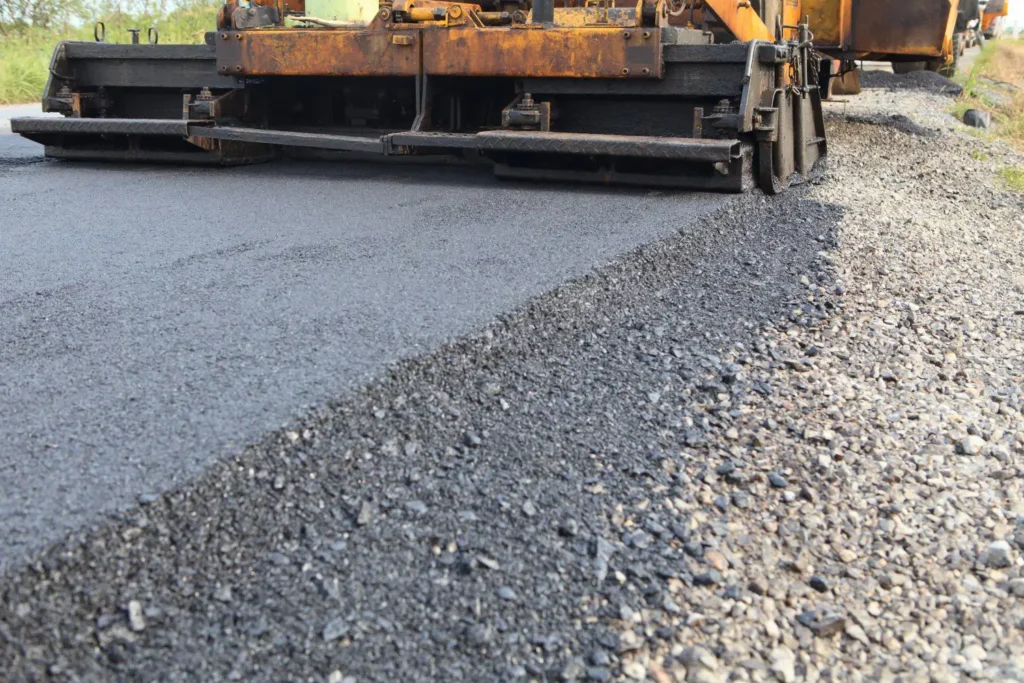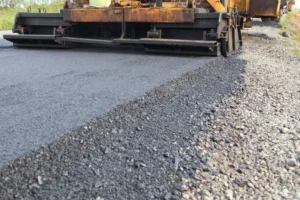Blacktop vs Asphalt
Many people think blacktop and asphalt are identical, but this isn’t the case. We understand the confusion, though: blacktop and asphalt look similar and are made of the same materials.
The differences lie in their mixing and preparation processes. So, what is blacktop made of and what is asphalt made of? Blacktop contains more crushed stone and less bitumen than asphalt does, and it is also heated at a higher temperature. Blacktop is typically heated to 150 degrees Celsius during production, while asphalt reaches around 120 degrees Celsius.
Installing blacktop vs asphalt depends on the purpose of the surface. While these materials are similar, they shouldn’t be used interchangeably. So, how do you know which material to use for a project? And what are the key benefits of each material?
We’ll discuss everything else you should know about blacktop pavement and asphalt below.
Projects for Asphalt vs Blacktop
What is blacktop best used for? And what is asphalt best used for? When considering blacktop vs asphalt, consider how much weight will travel over the surface and how often this weight will be applied. Simply put: are you surfacing a busy road or something smaller, like a driveway?
Asphalt is engineered to support large amounts of weight, while blacktop is engineered to last longer at a lower weight capacity. This means asphalt is your best bet for high-traffic areas like streets and highways. Blacktop, on the other hand, is a great option for projects like driveways, basketball courts, and paths.
There are several types of asphalt. This allows for several unique applications, increasing cost-effectiveness and durability based on your needs. Let’s become familiar with a few of these types:
- Hot Mix Asphalt: Hot mix asphalt is the most commonly used asphalt type and the most similar to blacktop. Its subtypes include stone matrix asphalt and porous asphalt. Stone matrix asphalt has a high amount of stone aggregates, which allow for more durability than asphalt binder. Stone matrix asphalt is a great choice for roadways. Porous asphalt is commonly used for stormwater management, helping naturally filter water and decrease stormwater runoff.
- Warm Mix Asphalt: Warm mix is nearly as versatile as hot mix asphalt, but is more environmentally friendly. The production process produces fewer emissions and uses less oil. Warm mix asphalt can also be applied outside of the typical paving season.
- Cold Mix Asphalt: Cold mix asphalt is not heated during its production. It lacks the durability of hot mix and warm mix asphalt but can be applied year-round. Because of this, it is only recommended for patching and repairs.
Benefits of Using Each Material
Blacktop and asphalt are both highly durable, but they each have their unique benefits and uses. Here’s how each material excels:
Benefits of Blacktop Pavement
- Blacktop pavement is optimal for low-traffic areas like basketball courts and driveways.
- It is easy to repair and often stays intact longer than asphalt does.
- Blacktop seal coating can preserve the appearance of your blacktop, keeping it fresh for years.
- Blacktop’s malleable composition makes it resistant to cracking and comfortable to walk on.
Benefits of Asphalt Pavement
- Asphalt absorbs heat from the sun, preventing icy road conditions.
- Asphalt is highly water-resistant, making it a reliable choice in rainy and flood-prone areas.
- Asphalt is highly versatile and can be installed to block sound or drain water.
- Superpave asphalt is especially suitable for heavy-traffic areas, staying intact long-term.
Cost Differences Between Asphalt & Blacktop
Since asphalt and blacktop are similar paving materials, they are similarly priced. The overall cost will depend on the total area covered, the thickness of paving materials, and the labor hours required for the job. In some cases, the time of year can also be a factor.
To make a cost-effective choice, you’ll need to think about the amount of traffic on your surface. High-traffic surfaces should be paved with asphalt, while low-traffic areas will generally benefit from blacktop pavement. The right choice will lower your maintenance costs in the long run.
The blacktop vs asphalt debate is often decided on a case-by-case basis, even when it comes to price.
Environmental Factors of Asphalt & Blacktop
Asphalt and blacktop can give off unwanted emissions during production, but advancements are being made to lower their environmental impact. Examples include warm-mix asphalt and cold-mix asphalt. Warm-mix asphalt doesn’t reach the heat of hot-mix asphalt, lowering the amount of oil needed in the production process. This also releases fewer harmful gasses into the air.
Cold-mix asphalt does not need to be heated, eliminating airborne emissions and providing earth-friendly patching methods year-round. Cold-mix and other asphalt types can also be produced with recycled materials.
Choose Asphalt Seal & Repair for Your Asphalt & Blacktop Projects in Green Bay
At Asphalt Seal & Repair, we offer long-term maintenance solutions for your asphalt and blacktop. Our experts use eco-friendly, highly reliable methods to seal cracks, enhance drainage systems, fill potholes, and more. Regardless of your surface’s material, we have the expertise to revitalize and strengthen it.
For quality materials, expert labor, and unmatched service in Wisconsin, contact our crew at Asphalt Seal & Repair today. We’ll patch, service, or seal any paved surface on your property.



